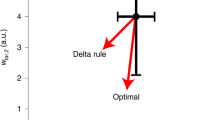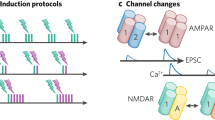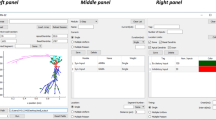Abstract
I like to draw a distinction between models and theories, and, although the dividing line can be fuzzy, I still think the difference is a real one. Models describe a particular phenomenon or process, and theories deal with a larger range of issues and identify general organizing principles. For example, one might make a model of some aspect of synaptic transmission and use this model to connect observations (fluorescence intensity as a function of time in an imaging experiment, for example) to some mechanistic aspect of synaptic function (such as vesicle recycling). A theory of synaptic transmission, by contrast, would have to account for many properties of synapse function, and relate these properties to principles of information processing. Such a theory might unify models of various forms of short-term plasticity (facilitation, depletion, augmentation and so on) and describe how dynamic filtering characteristics resulting from this plasticity optimize some aspect of information transfer. Models have a long history in neurobiology, from cable theory through the Hodgkin-Huxley equations, and at least some models are recognized as having been essential for the development of our subject. Theories, on the other hand, are scarce, and I cannot think of one that has made a really significant contribution to neurobiology.
Similar content being viewed by others
Main
Even so, I still believe that theories will be important—indeed vital—for further advances in the field. The reason for this belief is my observation that many areas of biology have progressed pretty much as far as they can by the current techniques of systematically changing one variable at a time to determine what causes what. For example, we have a pretty good idea about what V1 and MT do (although not how the neural circuits do it), but little notion about the function of the other three dozen visual areas. The approach that has been successful for understanding V1 and MT—noticing that certain stimulus properties induce firing of cortical neurons and then systematically characterizing those stimulus properties—may work for a few more visual areas, but I believe the parameter space that must be explored is too large for this approach to be successful for all visual areas. The stimulus parameters needed to describe V1 receptive fields are simple, but we do not even know how to characterize the complex receptive fields in inferotemporal cortex. We will need to develop theories of vision to guide experiments.
The development of theoretical neurobiology will come slowly, though, for at least two reasons. The first is that theory in biology is hard. In physics, everyone knows the important questions (how do you explain high-temperature superconductivity?), and the trick is to get an answer. In biology, however, one must simultaneously figure out the question to ask and how to answer it; this makes things both more difficult and more interesting. A second, related problem is that neurobiology lacks general laws (like the second law of thermodynamics) that can give traction in a problem; in biology, we must not only identify questions, but we need to formulate principles that can serve as the basis for general statements.
In discussions with colleagues, I detect an easing of the hostility toward theory that was common among experimental neurobiologists in the past, and I find a general acceptance of the notion that we must have theory in neurobiology. This atmosphere of acceptance is an essential ingredient for a theoretical neurobiology. Now the theorists must actually produce something of use.
Author information
Authors and Affiliations
Rights and permissions
About this article
Cite this article
Stevens, C. Models are common; good theories are scarce. Nat Neurosci 3 (Suppl 11), 1177 (2000). https://doi.org/10.1038/81451
Issue Date:
DOI: https://doi.org/10.1038/81451



